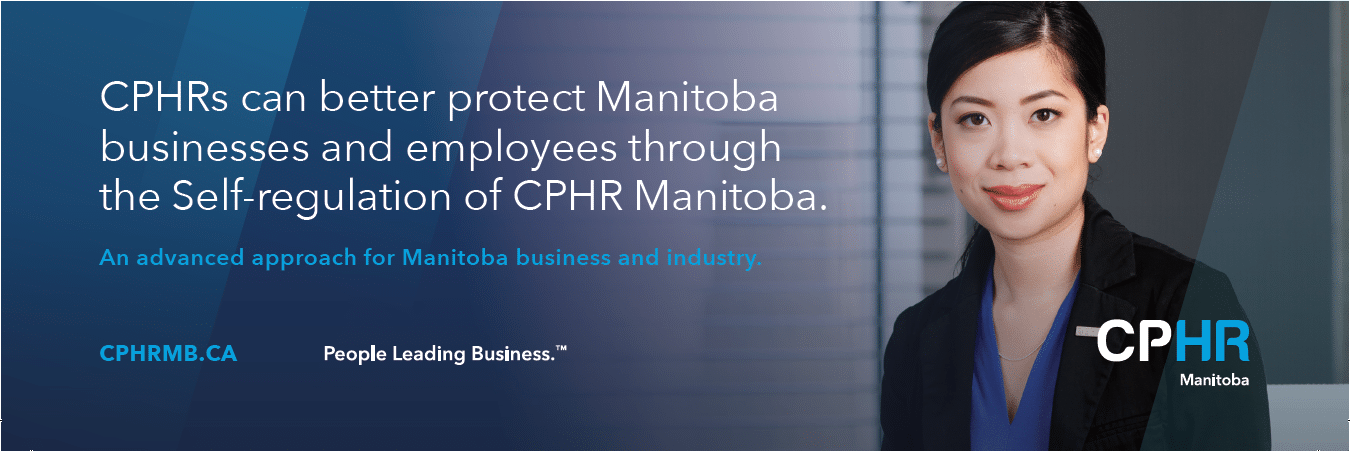The self-regulation of HR professionals is gaining attention and support from the business community in Manitoba, who see a strengthened HR function as a key to increasing prosperity and reducing risk for employers and employees alike.
Employers across Canada and around the world are facing similar challenges, competing in global marketplaces, dealing with changing social dynamics and meeting the increasing expectations of consumers and employees. It is becoming more evident that the role of Human Resources is critical to what used to be known as ‘the soft side’ of business, that is increasingly impacting the bottom line, at times even threatening a business’s survival.
“We live in interesting times” says Steve Chipman, Birchwood Group. “We rely on CPHRs to create the systems that protect us all, while we work together to achieve our individual and organizational goals.“
Loren Remillard, CEO of The Winnipeg Chamber of Commerce is seeing the effects firsthand. “Many of the topics that keep our members up at night revolve around HR issues, from promoting safe and respectful workplaces to managing the impact of legalized cannabis.”
The proposed provincial legislation on self-regulation would give CPHRs the authority and the responsibility to uphold the highest standards of HR practice in Canada, much like a CPA or a lawyer. It would hold CPHRs
legally responsible for the reasonable protection of the public. It would require CPHRs to meet the standards as set forth for professional development and ethical conduct in order to maintain their designation and it provides a forum for the public to register complaints.
Passing self-regulation legislation is seen by many in the business community as a practical and appropriate response to the issues of the day. “Strengthening the responsibility and authority of CPHRs to address issues like these effectively allows our business leaders to stay focused on the task at hand,” adds Remillard.
And the task at hand is great. Like much of Canada, Manitoba’s economy is growing and evolving. While it has
always been very diverse, industries that had been steady and stable for decades are seeing spikes and growth and/or challenging disruptions.
In some cases, local companies are the disruptors, like Skip the Dishes, who have grown their digital restaurant delivery service into a national brand, and New Flyer Industries, whose unprecedented growth CEO Paul Soubry attributes exclusively to people and purpose. “Our success is based entirely on the success of our people,” says Soubry, another strong supporter of the legislation. “Self-regulation will give all CPHRs the authority they need to more fully protect people and companies in Manitoba.“
Self-regulation will better support Manitoba employers by protecting them from exposure to unnecessary risks — everything from ensuring workplaces are inclusive, safe, and free from abuse, to responding appropriately to changing times, like the legalization of marijuana.
“What is increasingly obvious, even unavoidable, is that the success or failure of businesses today is highly reliant on sound culture and fair practice, this is where CPHRs offer their unique expertise”
But risk is only half the equation. Helping attract and keep the talent required; connecting business goals to job performance; and enhancing leadership skills at all levels are the factors that support continuous growth and improvement.
“It’s long been clear that solid HR practices are of great benefit to employees,” adds Ron Gauthier, CEO, CPHR Manitoba, “What is increasingly obvious, even unavoidable, is that the success or failure of businesses today is highly reliant on sound culture and fair practice, this is where CPHRs offer their unique expertise.”
The self-regulation of the HR profession is not a new concept in Canada, Ontario and Quebec both have self-regulation. Alberta and Saskatchewan are in conversation with their respective governments, as is Manitoba.
CPHR Manitoba is seeking title protection, which legislates the role of designated CPHRs and strengthens the value of CPHR members, who are held to the National standards of practice and code of ethics. But it doesn’t require HR practitioners to become designated or join the association to practice.
“We are a young profession and we are evolving as the industry evolves,” adds Gauthier. “It’s important that we continually raise the bar of HR practice in two ways, by encouraging HR practitioners to seek the designation and by supporting non-designated members in delivering according to our national standards.”
At the time of printing, self-regulation legislation in Manitoba is making its way through the halls of the Legislature.
“We have had some encouraging conversations with legislators of late,” adds Gauthier. “We look forward to more of this important dialogue over the coming months.”





